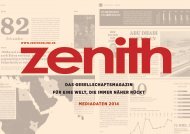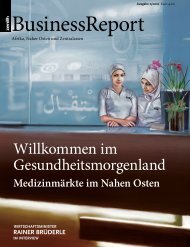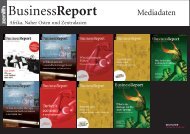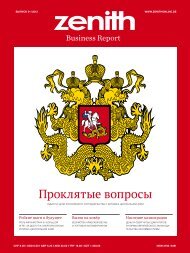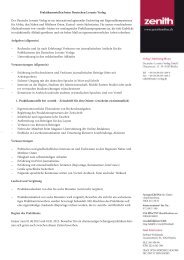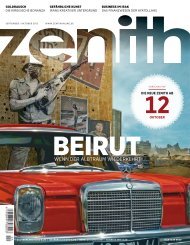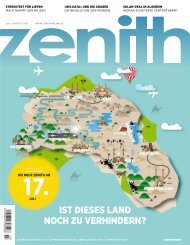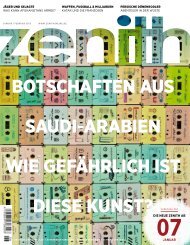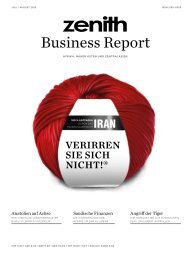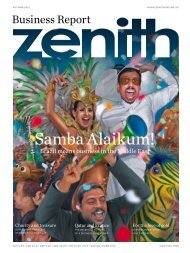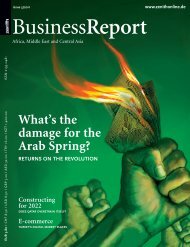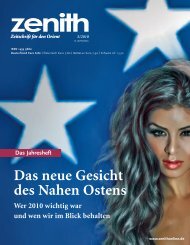Create successful ePaper yourself
Turn your PDF publications into a flip-book with our unique Google optimized e-Paper software.
illustration: Lesprenger<br />
reached by Sumru Altug, an economist at<br />
Koc University in Istanbul.<br />
The Turkish republic also suffered for a<br />
long time from the discrepancy between its<br />
political aspirations and economic performance.<br />
Now the tables are turning – the<br />
Turkish industry is producing household<br />
and kitchen appliances for export. Turkey<br />
has long been the world leader in bathroom<br />
ceramics, but now Turkish televisions are<br />
turning up in German electronics stores –<br />
and at the recent CeBIT computer show in<br />
Hanover, Turkey tried to steal some limelight.<br />
Laptops are even being produced in<br />
the Izmir region these days. Even though<br />
they are yet to find their way into the offices<br />
of German companies, they are proving<br />
popular in the Middle East and Central<br />
Asia – where the price means more than<br />
the brand name.<br />
For a long time, the world East of Gaziantep<br />
was merely a dark smudge on the<br />
consumer map. Even the economic policy<br />
makers of Turkey, most of whom had<br />
studied economics in Europe and America,<br />
looked to the European market for<br />
inspiration.<br />
This focus went hand-in-hand with the<br />
political desire to become a strategic partner<br />
of the USA and an equally valued member<br />
of the European Union. Europe still<br />
takes over 40 percent of Turkey’s exports<br />
– at least on a balance-sheet basis. Yet exports<br />
to Armenia, long considered to be the<br />
arch-enemy of Turkey, rose in 2010 to<br />
around USD 211 million.<br />
The volume of trade between Turkey and<br />
Iran is currently worth USD 10 billion.<br />
This figure is naturally attributable to its<br />
natural gas imports from Iran, but one<br />
glance at the reservation lists of mid-range<br />
hotels in Istanbul is enough to confirm that<br />
Iranian businesspeople, who can enter<br />
Turkey without a visa, are certainly regular<br />
visitors to the country. The cost of flights<br />
from Teheran to Istanbul is quite stiff – yet<br />
the planes are often booked out. For that<br />
reason alone, it is small wonder that Turkey<br />
has no time for sanctions against Iran. And<br />
many Turks wonder how well they would<br />
be doing if they had already gained entry<br />
into the EU. Its lucrative business with Iran<br />
would be threatened, and in the end they<br />
would be helping to prop up the debt umbrella<br />
over Greece.<br />
Exactly where Turkish companies had<br />
their fingers in the pie became clear in the<br />
recent Libyan crisis. Some 25,000 Turkish<br />
citizens, most of whom were stationed in<br />
Gaddafi’s oil empire as employees of construction<br />
companies, had to be flown out of<br />
the country. The mass exodus of »ex-pats«<br />
might serve as a reminder that the Turks<br />
did not flinch during Libya’s first liberation<br />
struggle against Italy in 1911, but stayed to<br />
fight with the rebels. Kemal Pascha, later<br />
known by the name of Atatürk, stood his<br />
ground there as a young officer of the military<br />
secret service.<br />
Where to with so<br />
much cash?<br />
However, Turkish foreign trade is not limited<br />
to the former provinces of the Ottoman<br />
Empire. Between Turkey and Angola, the<br />
El Dorado of South-west Africa, turnover<br />
of around USD 200 million was generated<br />
in 2010, in the mining and energy industry<br />
in particular. Steel production helped<br />
Turkey’s trade with Chile rise by almost 65<br />
percent year-on-year in 2010. USD 393<br />
million convinced both governments of<br />
the merits of a free trade agreement – this<br />
time to the benefit of the Turks.<br />
Such success stories make it seem almost<br />
surprising that, in 2010, Turkey posted a<br />
deficit of 5.9 percent in its current account<br />
– which was twice as high as in 2009. But<br />
importing energy and raw materials to service<br />
a growing economy always means<br />
spending some foreign currency. The weak<br />
euro over the past few months has made the<br />
lira, and consequently Turkish products,<br />
expensive for Europe. The central bank has<br />
had to devalue the currency, while simultaneously<br />
guarding against the risk of fuelling<br />
the inherent inflation tendencies.<br />
»The behaviour of the central bank here<br />
sometimes seems contradictory to outsiders,«<br />
says Marc Landau, CEO of the German-Turkish<br />
Chamber of Industry and<br />
Commerce in Istanbul. Turkish econo-<br />
TuRkEy<br />
mists talk of »unconventional methods« in<br />
the country’s monetary policy. On the one<br />
hand, key interest rates fell as a means of<br />
weakening the lira, while minimum reserve<br />
ratios rose in early 2010 from 6 to 10 percent.<br />
As a result, the commercial banks had<br />
to store money with the central bank,<br />
which reduced their liquidity. At the same<br />
time, the rate of the European Central<br />
Bank was about 2 percent.<br />
The flow of foreign capital onto the Turkish<br />
market made monetary authorities<br />
nervous. Where to with the capital that was<br />
coming partly from funds and partly from<br />
being loaned in Europe at low interest rates?<br />
Between January and November 2010,<br />
around USD 4.1 billion worth of investment<br />
money flowed onto the Turkish market<br />
– as opposed to 6.2 billion of foreign<br />
direct investment (FDI).<br />
The major stock corporations are currently<br />
paying respectable dividends. Over<br />
the past five years, the Turkcell mobile phone<br />
company has distributed a total of EUR<br />
3.7 billion to shareholders. Petrogiant<br />
Tüpras paid out EUR 2.9 billion and Akbank<br />
some EUR 2.4 billion. But not all sectors<br />
are booming by any means. High-end<br />
department stores and the imported sedans<br />
that are the vehicle of choice in the<br />
major metropolitan centres, are also a reminder<br />
of the flip side of development.<br />
When an economy imports more than it<br />
exports, it has to borrow to pay the bills.<br />
The regional differences in the trend are<br />
typical of fast-emerging nations like Turkey<br />
– and they tend to be extreme in nature.<br />
The average income in the greater Istanbul<br />
region is four times as high as in the East<br />
Anatolian province of Van, and not just because<br />
several hundred millionaires on the<br />
Bosporus tend to distort the statistics. The<br />
greater Istanbul area is followed by the Kocaeli<br />
Province in the Marmara region.<br />
Kayseri in Central Turkey likes to think<br />
of itself as the »Anatolian Tiger« but even it<br />
has only half the purchasing power of Istanbul.<br />
Prime Minister Erdogan comes<br />
from Istanbul; Kayseri is the birth place of<br />
President Gül and is seen as the Islamic<br />
conservative stronghold of the ruling party,<br />
AKP.<br />
BusinessReport 1/2011 15<br />
>>



